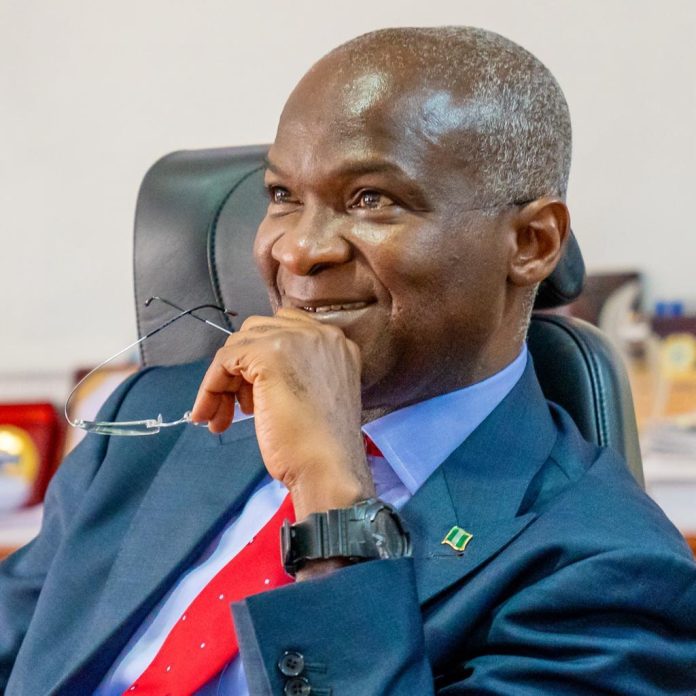EKO CLUB 50TH ANNIVERSARY CELEBRATION LECTURE ON THE THEME, “THE ROLE OF SOCIAL CLUBS IN SOCIAL ENGINEERING” DELIVERED ON WEDNESDAY, 11TH SEPTEMBER 2024, AT THE EKO CLUB, BLESSINGS HALL, BODE THOMAS, SURULERE
Mr. President, Members of the Executive Committee, Members of Eko Club, Invited Guests, Distinguished Ladies and Gentlemen.
It is only fitting and proper that I commence this address with hearty words of congratulations. I offer congratulations to the Eko Club—my club—and to all who have served her in one capacity or another, contributing to the building of a brand that has endured for five decades and has transcended the shores of Nigeria.
As current members, our debt of gratitude to the founders is unquantifiable and irredeemable. Their farsighted vision 50 years ago laid enduring foundations upon which we proudly stand today.
History has been and will remain kind to their blessed memories because their legacy endures. As inheritors of their legacy, we must, as we do now, celebrate these golden moments, but we must not unduly dwell on them because they are already done and behind us.
Rather, while we remain very proud of our historic past, we must focus sharply on the future because the blessings and opportunities that lie ahead for the Eko Club family in the next 50 years far exceed anything we have experienced in the last 50 years.
This is why the team of President Razak Olugbenga Amodu, his executive members, and the planning committee deserve our utmost commendation—not only for convening this conversation but, importantly, for selecting the subject: “THE ROLE OF SOCIAL CLUBS IN SOCIAL ENGINEERING.”
First, let me note that a cursory check on my search engine shows that the history of social clubs dates back to the second half of the 19th century. However, I want to focus on the reason for their existence.
According to Wikipedia, a social club is “a group of people or the place where they meet, generally formed around a common interest.” And that is the important thing—a common interest. What is the common interest of the members of Eko Club? The history of the club and its constitution provide useful answers, and I will come to them shortly.
Before I do so, let me assert—with little, if any, disagreement—that we all share a common interest in the well-being of our families, our community, our safety and security, and our quality of life, especially how the economy impacts us in terms of employment, income, cost of living, healthcare, education, and similar issues.
Of course, we are also concerned about how our government, in a representative democracy, ensures that our common interest in these things is preserved, protected, and promoted.
I will return to examine some of these points in more detail, as time permits.
For now, let us go back to the founding of Eko Club in 1974. History tells us that Eko Club was created by a group of young men who, like all social clubs by definition, had a “common interest.” The name they chose—Eko Club instead of Lagos Elite Club or Lagos Social Club—is instructive.
They were largely from Eko (as distinct from Lagos State), and this difference has been important from the days of “Gẹ̀dẹ̀gbé L’Ekó wà” till today, even as the history of Nigeria and its component parts is being revised by revisionists.
While history is being revised about the development of Lagos, there is no such endeavour concerning the development of Eko. Of course, the other areas of common interest of these young men predominantly from Eko are found in their constitution.
Many thanks to the current president, Mr. Razak Olugbenga Amodu, for promptly obliging me with a copy of the current edition of the constitution at the shortest notice.
As will be seen from the constitution—especially under Articles Two and Three, which deal with the “Main Objectives” and “Aims and Objectives,” respectively—Eko Club is a socio-cultural organization aimed at protecting and promoting the interests of its members in all spheres of life… “without being politically partisan.”
We also see that the club has expanded its area of interest beyond “Eko” to “Lagos State” as it seeks in the five aims and objectives to:
1. Foster and promote fellowship and brotherhood among members;
2. Support all proper and lawful actions in the interest and welfare of members;
3. Promote and organize social, cultural, educational, sporting, and other activities and cooperation between the club and other similar organizations;
4. Promote and protect the interest and welfare of indigenes of Lagos State in the social and economic development of the state;
5. Invest and manage the club’s funds for the mutual interest and benefit of its members.
From the foregoing, we see that the common interest of Eko Club members lies in their own welfare, education, sports, all lawful interests of members, and the interest and welfare of the indigenes of Lagos State.
Let me connect with the educational and sporting side of these objectives by disclosing that I used to play tennis in this club in 1983 when I was 20 years old, until the Onigbanjo brothers, who worked then at National Oil and Chemical Marketing Company, suggested to my father that he enlist me at Shell Club because none of the members in Eko Club could cope with the speed and pace of my game.
That tennis court at Eko Club was eventually transformed into the space that became the arcade for parties and is now occupied by the banquet hall. I am happy to remark that other sports have survived. Of course, Eko Club was also famously the place for many matchmaking experiments, and I believe many thriving marriages today are the result of those endeavours.
To the extent that marriages and families they build are part of the community of common interest, Eko Club has thrived. While my late father’s endeavours at matchmaking with some of his friends’ daughters, who attended the same university, were fruitless, I was a frequent and often welcome guest at Eko Club throughout my university days.
I was thankfully mentored by many great members of this club in those days, and I believe Eko Club can take much credit in shaping me.
In terms of the social and economic development of the state, let me use this moment to again thank Eko Club for accepting to host a stakeholders meeting to discuss the law passed by the Lagos State House of Assembly to restrict the movement of motorcyclists on certain classes of roads in the state.
The interaction helped the government provide explanations and clarifications on things that were not understood. This understanding converted members and stakeholders into advocates for the policy.
Let me point out that other social clubs eventually followed the lead of Eko Club on this matter, and the rest is now history. Communication between government and the governed improved, and the community and state were better served.
This appears for me to be the tipping point in our conversation today, which is “The Role of Social Clubs in Social Engineering.” As we have seen in the examples I have shared, Eko Club encouraged its members’ children to take up sports, turning them away from gangs and drugs. It encouraged them to accept responsibility by getting married and starting families. Eko Club also interacted with the government to understand and discuss policy.
All of these are acts of, or in aid of, social engineering, defined by Merriam-Webster as “…the use of centralized planning in an attempt to manage social change and regulate the future development and behaviour of a society…”
We will see from this definition that it speaks about future development and accords with my suggestion that we focus on the next 50 years rather than dwell excessively on the last fifty.
Therefore, in a representative democracy, a social club like Eko Club has a very topical role to play in the social engineering or re-engineering of Nigeria. In matters relating to our interest in the welfare of the people of Lagos State and the development of Lagos State, matters such as how to live in peaceful harmony with those who have settled amongst us should interest us.
Matters relating to global developments like climate change, flooding, and artificial intelligence and their impact on us over the next 50 years must interest us, and spur us to play a role.
The emerging opioid and drug abuse challenges that we grapple with privately as individuals and families, security issues, and economic challenges must define roles for Eko Club over the next 50 years if she must stay true to the aims and objectives of her constitution. After all, if the interest and welfare of indigenes concern us, the interest of one is the interest of all.
How can we better play our role as Eko Club, one might ask?
Some of the programmes and events undertaken by the club at seasonal and festive occasions already provide platforms for playing this role across different demographics, religions, and age groups within the club.
I propose, therefore, the consideration of periodic town halls, stakeholder forums, ranging from 60 to 90 minutes speeches, panel discussions, question-and-answer sessions, business luncheons, and dinners inviting persons of know-how and persons of interest.
These can happen monthly, quarterly, half-yearly, and yearly as the status of the guest demands, and they do not hamper the social ethos of the club.
From councillors, local government chairmen, House of Assembly members, state commissioners, permanent secretaries and directors, House of Representatives members, senators, to governors, ministers, and other federal appointees, commissioners of police, and our local division police officers, we can interact more to learn what public office holders are doing about our lives and what we can do to enable them.
Some of the social clubs that preceded Eko Club played critical roles in the events that occurred in the evolutionary history of Nigeria.
From the politics of social segregation to the agitation for the end of colonialism and independence to the campaign for Nigerian manpower into the public and private sector resulting in policies such as indigenization, social clubs and their members have been the champions of these causes because they represent matters of dominant common interest.
Sports is the biggest source of employment hiding in plain sight in an environment dealing with high youth unemployment.
Eko Club must go back to its sporting aims and objectives and play a leading role in the revival of youth inter-club competitions.
We cannot leave the success of our athletes at international sports events to only what the Government does.
It is my humble view that we have been a little too removed from matters that affect our common interests. If you will pardon me for saying so, Eko Club is too big, too prestigious to be recognized merely as a venue for parties, anniversaries, and weddings, important as these may be to the social engineering purpose.
Eko Club, and indeed other social clubs, used to be the places where government policies were first hinted at, discussed, or debated before they were made public.
In seeking to better play the social engineering role of developing society for the future, I suggest that the club must be more deliberate and intentional in the quality and process of membership recruitment. This process will determine the extent to which the club can fulfill the role envisioned by the founders, as documented in the constitution.
When I served as the Governor of Lagos State, I took a cue from this tradition by consistently using social clubs as platforms to test and disseminate new policies. One notable example, as mentioned earlier, was the introduction of the Lagos State Road Traffic Law in 2012, which aimed to improve road safety and traffic management in the state.
By engaging with social clubs, starting with Eko Club, we were able to gather valuable feedback and build public support before implementing the law and other policies. This approach ensured that our policies were well-received and effectively integrated into the fabric of society.
As challenging and perplexing as the journey of establishing a club like Eko must have been for the founders, it is remarkable that their disagreements never escalated into courtroom battles. This was not because they lacked lawyers or judges; on the contrary, the club was awash with such members. However, those members possessed immense character that enabled them to find other ways to resolve disputes than in a courtroom.
I say this not to cast aspersions on any person but to remind us all of an unpleasant era in our proud history and heritage. It is a period we must be intentionally mindful of to ensure that it never repeats itself. It would be a significant blow to our major objective of pursuing our common interest and contributing to shaping our society.
Because other social clubs have also been, or are still embroiled in, one form of court dispute or another, which has hobbled their purpose, this anniversary lecture provides an opportunity to express gratitude to the men and women of goodwill who intervened to put an end to that cloudy era.
May the tribe of such men and women never diminish, and may they multiply within the portals of Eko Club.
Ladies and gentlemen, while we are all diverse in our interests, I believe I have left no one in doubt about the kind of Eko Club I envision. However, I acknowledge and respect that there may be dissenting, moderating, amplifying, and other views.
I think the effort of the planning committee and the executive members would be worth its weight in gold if a team of members is constituted to listen to those other voices so that something can finally be agreed upon as a way forward.
This should pave the way for planning and scheduling events that may be agreed upon, publicizing them, and funding them through donations and sponsorships by individuals and corporations who may be so disposed.
Let me conclude by thanking you for inviting me as your speaker for this occasion and for your attention.
Blessings to all, and Happy 50th Anniversary.
Babatunde Raji Fashola, SAN, CON






